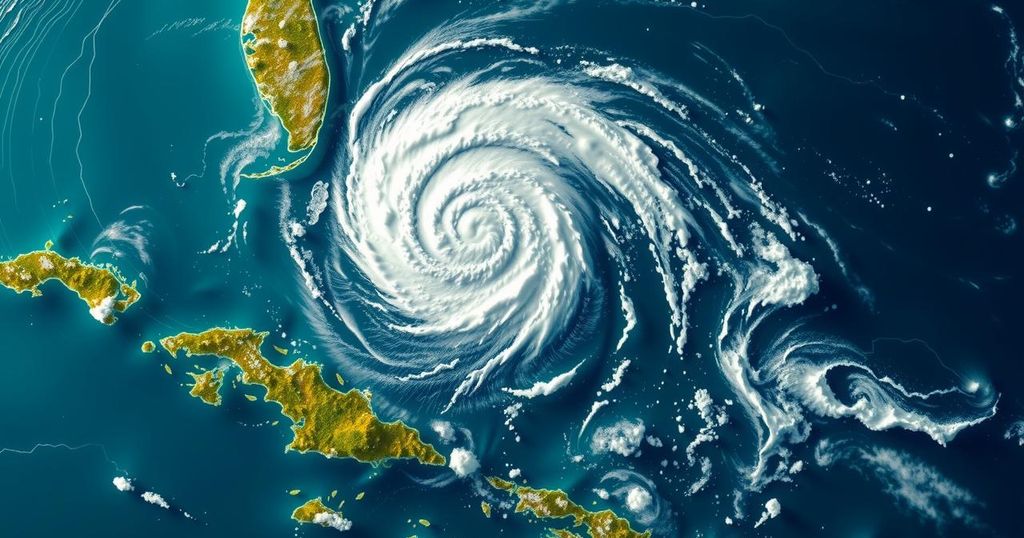Tropical Storm Oscar Approaches the Bahamas After Impacting Cuba
Tropical Storm Oscar, having made landfall in Cuba as a Category 1 hurricane and caused at least six fatalities, is currently moving towards the Bahamas. It is expected to bring significant rainfall, raising concerns of flooding and landslides. Oscar has been noted for its unusually small wind field and has been declared the smallest recorded hurricane. The storm is part of a forecasted above-average Atlantic hurricane season, which includes several named storms and hurricanes anticipated before the season concludes.
On Tuesday, Tropical Storm Oscar advanced towards the Bahamas after striking Cuba as a Category 1 hurricane, resulting in the fatalities of at least six individuals due to the storm’s severity. The storm produced heavy rainfall on an island already grappling with a significant power outage. As of Tuesday morning, Oscar was positioned approximately 45 miles (75 kilometers) south-southeast of Long Island in the Bahamas, exhibiting winds of 40 mph (65 kph) and traveling at a speed of 12 mph (19 kph) in a north-northeast direction, as reported by the National Hurricane Center in Miami. The center has classified Oscar as a barely functioning tropical storm. It is forecasted that the storm may bring up to 5 inches (13 centimeters) of rain across the southeastern Bahamas, with isolated areas potentially receiving up to 8 inches (20 centimeters). A tropical storm warning has been issued for the central and southeastern regions of the Bahamas. Notably, Oscar has recorded the smallest wind field for a hurricane in history, measuring just about 6 miles (10 kilometers). Its landfall on Grand Inagua Island in the Bahamas was unexpected, followed by a secondary landfall on eastern Cuba late Sunday. Michael Lowry, a hurricane specialist and storm surge expert, commented on the forecasting challenges, stating that “It is not often we see a colossal failure in hurricane forecasting,” emphasizing that the meteorological models failed to predict Oscar’s intensification into a hurricane. In Cuba, Oscar caused at least 15 inches (38 centimeters) of rainfall in parts of eastern regions, posing risks of severe flooding and possible landslides. The recorded fatalities occurred in Guantánamo as the country continues to recover from a significant blackout that has prompted several minor protests and stern government warnings against civil unrest. Oscar is recognized as the 15th named storm and the 10th hurricane of this Atlantic hurricane season, which runs from June 1 to November 30. The National Oceanic and Atmospheric Administration has anticipated an above-average Atlantic hurricane season due to record-high ocean temperatures, predicting between 17 to 25 named storms and four to seven major hurricanes of Category 3 or higher. In parallel, Tropical Storm Kristy is currently active over the Pacific Ocean, positioned 375 miles (605 kilometers) west-southwest of Acapulco, Mexico, with maximum sustained winds of 50 mph (85 kph) and moving west-northwest at a speed of 15 mph (24 kph). Kristy is expected to escalate to hurricane status by Tuesday night.
Tropical Storm Oscar is part of the 2023 Atlantic hurricane season, which typically spans from June 1 to November 30. This year, meteorologists from the National Oceanic and Atmospheric Administration (NOAA) have predicted an above-average season, influenced largely by unusually warm ocean temperatures, which heightens the likelihood of severe storms. The phenomenon of hurricanes transforming into tropical storms, often impacting areas with existing vulnerabilities, highlights the unpredictability of storm forecasts and the importance of accurate meteorological modeling. Oscar’s impact on Cuba, particularly in the context of ongoing power issues, exemplifies the interplay between natural disasters and socio-political conditions.
Tropical Storm Oscar’s approach to the Bahamas following its landfall in Cuba accentuates the unpredictable nature of hurricane forecasting and the severe implications such storms have on affected regions. The fatalities and damages incurred during this weather event underscore the critical need for vigilant preparedness in the face of changing climate patterns. As the Atlantic hurricane season progresses, attention is being drawn to both Oscar’s effects and the concurrent activity of Tropical Storm Kristy, indicating a potentially more tumultuous season ahead.
Original Source: www.usnews.com




Post Comment